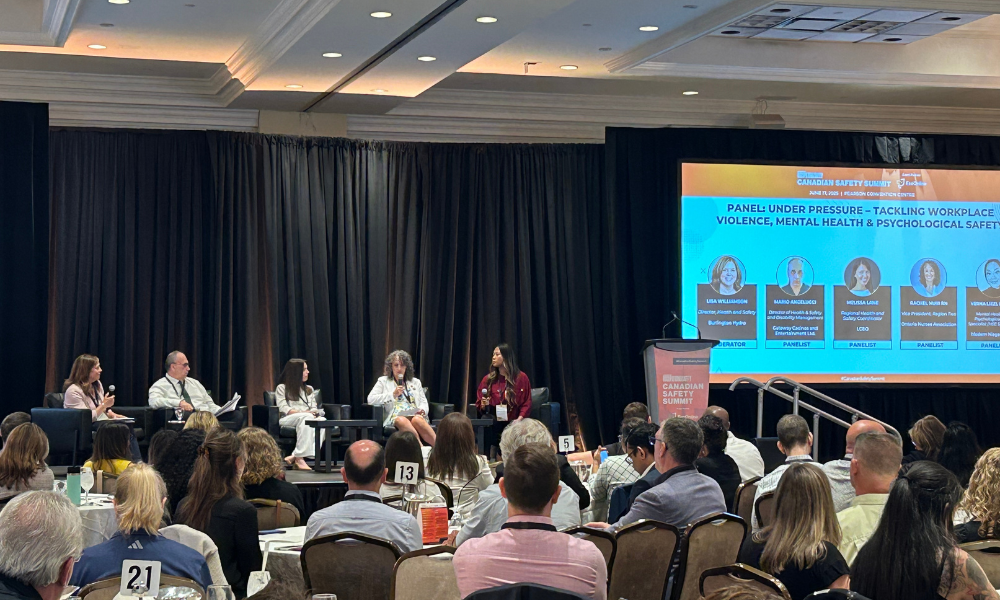
An Ontario employer’s drug and alcohol testing policy is good, but the employer didn’t correctly apply it when ordering a worker to be tested following a workplace incident, an arbitrator has ruled.
George Degg, 69, was an electrician with Jacobs Industrial, a Toronto-based industrial engineering firm. Degg worked on-and-off for Jacobs since 1997 and was hired full-time in 2008. Other than once being cautioned to use his earplugs, he had never been disciplined during his tenure with Jacobs and was co-chair of the company’s joint health and safety committee for a time. He was also a steward.
Jacobs was the maintenance contractor at a Suncor lubricants refinery in Mississauga, Ont., which was a highly safety sensitive site with pressured materials and poisonous gases. There were also risks of explosions, electric shocks and releases of hot steam and toxic substances that could cause burns. As a result of its safety sensitive operations, Jacobs had a drug and alcohol policy that required post-incident testing if external factors were eliminated as a possible cause of the incident.
The policy defined an incident as “an occurrence, circumstance or condition that caused or had the potential of causing damage to person, property, reputation, security or the environment.” It also stipulated that employees who refused to participate in investigations and submit to alcohol and drug testing would be subject to discipline, up to and including termination of employment. However, testing could not be required automatically; it would be required only following an investigation to determine if alcohol or drug use couldn’t be ruled out as a cause of the incident. If it was clear drugs or alcohol weren’t a factor, supervisors could waive testing under the policy.
Degg’s job was specified under the policy as a safety sensitive position “in which incapacity due to drug or alcohol impairment could result in direct or significant risk or injury to the employee, others or the environment.” He had been trained on the policy and had signed acknowledgment of it when re-hired in 2008. In addition, as a steward he was responsible for the orientation of new electricians onsite and went through the company policies with them. As a result, he was very familiar with Jacobs’ policies, including the drug and alcohol policy.
When the company implemented the policy, the union’s business agent felt it couldn’t require testing of its employees at all, based on the Ontario government’s failure to specifically address it. He advised union members, including Degg, that they didn’t have to comply with the testing and the union would grieve any discipline for refusals. Degg also informed new electricians of the union’s position during orientation.
Fender bender in parking lot
On May 30, 2012, Degg was driving a Suncor pickup truck to the Jacobs onsite office to see his general foreman. The office was in a trailer on the Suncor site. Degg was wearing a hard hat, safety glasses and ear plugs, the safety equipment required for the site.
Reverse parking was mandatory on the Suncor site, so Degg drove the truck in a large sweeping arc in the parking lot so he could see everything, before reversing into a spot. However, instead of backing into an empty spot, he hit another vehicle parked by the trailer office which he hadn’t seen. He didn’t turn around to look directly back because he had a herniated disk and could only turn around if he took off his seatbelt — which he didn’t want to do since he didn’t want to drive without the seatbelt on.
Two other workers were standing in the parking lot as Degg arrived and observed him circle around the lot. They saw him briefly stop, adjust his mirrors, and reverse into the parked car. Degg didn’t ask them to assist him, and one of the workers claimed they didn’t have time to offer any help before he started to reverse. One of the workers tried to get Degg’s attention by waving to warn him, but Degg didn’t see him and his windows were closed.
The trailer hitch of the pickup truck hit the parked vehicle and caused minor damage. Degg asked the other workers why they didn’t spot him, and one of them asked “Are you kidding?” since they felt he hadn’t given them the opportunity to do so. Jacobs policy for reversing to park required any employee alone in a vehicle to ask anyone nearby to spot and any employee standing in a parking lot where a vehicle was backing up was obliged to offer assistance.
Degg asked if anyone was in the trailer, to which they replied that the site superintendent was. Degg looked for the general foreman and claimed not to have seen the site superintendent, so he left in the truck to remove a lock on a transformer that he needed to take care of before the end of his shift. The other workers found the superintendent in the trailer and reported the incident. The superintendent radioed the general foreman to find Degg and bring him back to the trailer.
Degg explained that he hadn't seen the vehicle he had backed into and didn’t ask the others to help spot him. He also said he left the scene to find the foreman. No one at the time noticed anything in Degg’s behaviour or appearance to suggest impairment.
The superintendent completed a checklist that Jacobs had for management that was used to identify causes of the incident and what corrective action was needed, and determined if the incident had not been caused by any outside factors. Degg’s omissions were found to be contributing factors and, since alcohol or drugs couldn’t be ruled out, Degg was ordered to take a test.
Worker refused to take test
Degg refused to take the test, as he had been advised to do by the union business manager. He was then escorted off-site by the foreman but not driven home. Degg claimed he was told he was being terminated, but the company claimed he was suspended until he agreed to a test. The company sent a letter to the union the next day confirming that Degg wouldn’t be eligible to work until he was assessed by substance abuse expert and took a test.
The union filed a grievance on Degg’s behalf, claiming the circumstances didn’t warrant a violation of Degg’s privacy rights and the collective agreement.
The arbitrator found it was understandable that Degg thought he was being dismissed for not complying with the policy, as the original policy in 2008 when he was hired permanently said as much. In 2011, the policy was amended to allow for a suspension and give the employee another chance to comply. However, this change didn’t adversely impact employees even if they didn’t know about it, as Degg apparently didn’t, said the arbitrator.
The arbitrator found that getting information from the employee by the least intrusive means was preferable, but simply asking Degg if he had consumed drugs or alcohol wouldn’t have changed the process under the policy — a test would still be required. In addition, simple observations by witnesses wouldn’t be enough to eliminate the need for a test. Employers need such information to ensure a safe workplace, said the arbitrator.
“Post-incident testing is based on the incident itself; in a safety sensitive environment, knowing that physical observation of impairment is unreliable, and that an employee may be impaired yet show no sign of it, the occurrence of a significant accident or near-miss, which appears to be the result of the employee’s carelessness or wilfulness, leads an employer reasonably to want to know whether the employee’s act was merely the result of an error in judgment or whether it was the result of being impaired, of being partially disabled from something consumed, whether medical or intoxicant,” said the arbitrator.
However, while the company’s policy for testing was appropriate and should be followed in the wake of a workplace incident, the arbitrator found the policy didn’t need to be followed in this case, due to the fact the accident was minor enough that didn’t meet the definition of “incident” under the alcohol and drug policy. In addition, jurisprudence has indicated that post-incident testing must be justified by “some substance, some materiality, to the harm caused” — or a near-miss with significant potential harm.
The arbitrator found that the damage to the parked vehicle was minimal, and if the truck Degg was driving didn’t have a trailer hitch, there might not have been any damage at all. Degg explained how the accident happened, and this provided management with sufficient opportunity to exclude the possible influence of drugs or alcohol on Degg’s actions, said the arbitrator. The policy itself stipulated testing should only be implemented if there was no credible explanation for the employee’s behaviour in the incident. In this case, there was a credible explanation and no reason to suspect drugs or alcohol, particularly since Degg had no history of drug or alcohol abuse or any disciplinary record during his relatively long tenure.
“This was not a significant accident; it was minor,” said the arbitrator. “It did not reach the threshold required to put an individual employee through the intrusive experience of drug and alcohol testing.”
This article originally appeared in the March 2016 issue of Canadian Safety Reporter, a sister publication of COS that looks at occupational health and safety legislation.
George Degg, 69, was an electrician with Jacobs Industrial, a Toronto-based industrial engineering firm. Degg worked on-and-off for Jacobs since 1997 and was hired full-time in 2008. Other than once being cautioned to use his earplugs, he had never been disciplined during his tenure with Jacobs and was co-chair of the company’s joint health and safety committee for a time. He was also a steward.
Jacobs was the maintenance contractor at a Suncor lubricants refinery in Mississauga, Ont., which was a highly safety sensitive site with pressured materials and poisonous gases. There were also risks of explosions, electric shocks and releases of hot steam and toxic substances that could cause burns. As a result of its safety sensitive operations, Jacobs had a drug and alcohol policy that required post-incident testing if external factors were eliminated as a possible cause of the incident.
The policy defined an incident as “an occurrence, circumstance or condition that caused or had the potential of causing damage to person, property, reputation, security or the environment.” It also stipulated that employees who refused to participate in investigations and submit to alcohol and drug testing would be subject to discipline, up to and including termination of employment. However, testing could not be required automatically; it would be required only following an investigation to determine if alcohol or drug use couldn’t be ruled out as a cause of the incident. If it was clear drugs or alcohol weren’t a factor, supervisors could waive testing under the policy.
Degg’s job was specified under the policy as a safety sensitive position “in which incapacity due to drug or alcohol impairment could result in direct or significant risk or injury to the employee, others or the environment.” He had been trained on the policy and had signed acknowledgment of it when re-hired in 2008. In addition, as a steward he was responsible for the orientation of new electricians onsite and went through the company policies with them. As a result, he was very familiar with Jacobs’ policies, including the drug and alcohol policy.
When the company implemented the policy, the union’s business agent felt it couldn’t require testing of its employees at all, based on the Ontario government’s failure to specifically address it. He advised union members, including Degg, that they didn’t have to comply with the testing and the union would grieve any discipline for refusals. Degg also informed new electricians of the union’s position during orientation.
Fender bender in parking lot
On May 30, 2012, Degg was driving a Suncor pickup truck to the Jacobs onsite office to see his general foreman. The office was in a trailer on the Suncor site. Degg was wearing a hard hat, safety glasses and ear plugs, the safety equipment required for the site.
Reverse parking was mandatory on the Suncor site, so Degg drove the truck in a large sweeping arc in the parking lot so he could see everything, before reversing into a spot. However, instead of backing into an empty spot, he hit another vehicle parked by the trailer office which he hadn’t seen. He didn’t turn around to look directly back because he had a herniated disk and could only turn around if he took off his seatbelt — which he didn’t want to do since he didn’t want to drive without the seatbelt on.
Two other workers were standing in the parking lot as Degg arrived and observed him circle around the lot. They saw him briefly stop, adjust his mirrors, and reverse into the parked car. Degg didn’t ask them to assist him, and one of the workers claimed they didn’t have time to offer any help before he started to reverse. One of the workers tried to get Degg’s attention by waving to warn him, but Degg didn’t see him and his windows were closed.
The trailer hitch of the pickup truck hit the parked vehicle and caused minor damage. Degg asked the other workers why they didn’t spot him, and one of them asked “Are you kidding?” since they felt he hadn’t given them the opportunity to do so. Jacobs policy for reversing to park required any employee alone in a vehicle to ask anyone nearby to spot and any employee standing in a parking lot where a vehicle was backing up was obliged to offer assistance.
Degg asked if anyone was in the trailer, to which they replied that the site superintendent was. Degg looked for the general foreman and claimed not to have seen the site superintendent, so he left in the truck to remove a lock on a transformer that he needed to take care of before the end of his shift. The other workers found the superintendent in the trailer and reported the incident. The superintendent radioed the general foreman to find Degg and bring him back to the trailer.
Degg explained that he hadn't seen the vehicle he had backed into and didn’t ask the others to help spot him. He also said he left the scene to find the foreman. No one at the time noticed anything in Degg’s behaviour or appearance to suggest impairment.
The superintendent completed a checklist that Jacobs had for management that was used to identify causes of the incident and what corrective action was needed, and determined if the incident had not been caused by any outside factors. Degg’s omissions were found to be contributing factors and, since alcohol or drugs couldn’t be ruled out, Degg was ordered to take a test.
Worker refused to take test
Degg refused to take the test, as he had been advised to do by the union business manager. He was then escorted off-site by the foreman but not driven home. Degg claimed he was told he was being terminated, but the company claimed he was suspended until he agreed to a test. The company sent a letter to the union the next day confirming that Degg wouldn’t be eligible to work until he was assessed by substance abuse expert and took a test.
The union filed a grievance on Degg’s behalf, claiming the circumstances didn’t warrant a violation of Degg’s privacy rights and the collective agreement.
The arbitrator found it was understandable that Degg thought he was being dismissed for not complying with the policy, as the original policy in 2008 when he was hired permanently said as much. In 2011, the policy was amended to allow for a suspension and give the employee another chance to comply. However, this change didn’t adversely impact employees even if they didn’t know about it, as Degg apparently didn’t, said the arbitrator.
The arbitrator found that getting information from the employee by the least intrusive means was preferable, but simply asking Degg if he had consumed drugs or alcohol wouldn’t have changed the process under the policy — a test would still be required. In addition, simple observations by witnesses wouldn’t be enough to eliminate the need for a test. Employers need such information to ensure a safe workplace, said the arbitrator.
“Post-incident testing is based on the incident itself; in a safety sensitive environment, knowing that physical observation of impairment is unreliable, and that an employee may be impaired yet show no sign of it, the occurrence of a significant accident or near-miss, which appears to be the result of the employee’s carelessness or wilfulness, leads an employer reasonably to want to know whether the employee’s act was merely the result of an error in judgment or whether it was the result of being impaired, of being partially disabled from something consumed, whether medical or intoxicant,” said the arbitrator.
However, while the company’s policy for testing was appropriate and should be followed in the wake of a workplace incident, the arbitrator found the policy didn’t need to be followed in this case, due to the fact the accident was minor enough that didn’t meet the definition of “incident” under the alcohol and drug policy. In addition, jurisprudence has indicated that post-incident testing must be justified by “some substance, some materiality, to the harm caused” — or a near-miss with significant potential harm.
The arbitrator found that the damage to the parked vehicle was minimal, and if the truck Degg was driving didn’t have a trailer hitch, there might not have been any damage at all. Degg explained how the accident happened, and this provided management with sufficient opportunity to exclude the possible influence of drugs or alcohol on Degg’s actions, said the arbitrator. The policy itself stipulated testing should only be implemented if there was no credible explanation for the employee’s behaviour in the incident. In this case, there was a credible explanation and no reason to suspect drugs or alcohol, particularly since Degg had no history of drug or alcohol abuse or any disciplinary record during his relatively long tenure.
“This was not a significant accident; it was minor,” said the arbitrator. “It did not reach the threshold required to put an individual employee through the intrusive experience of drug and alcohol testing.”
This article originally appeared in the March 2016 issue of Canadian Safety Reporter, a sister publication of COS that looks at occupational health and safety legislation.





